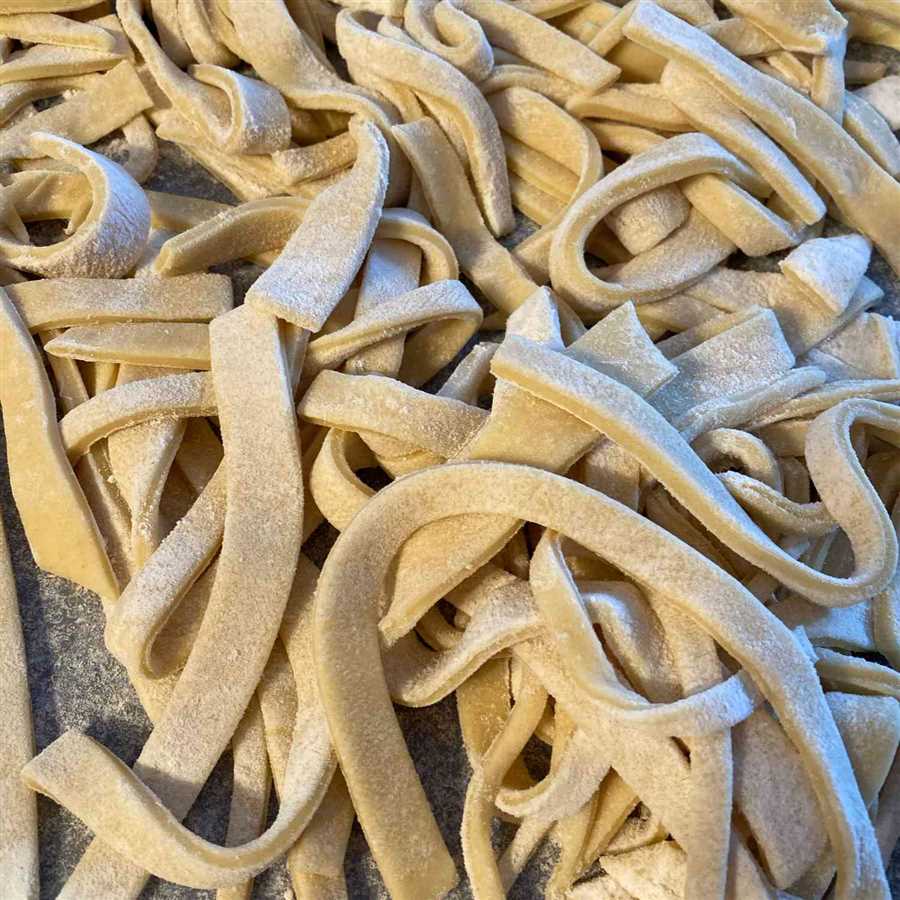



Homemade egg noodles are a delicious and versatile option for pasta dishes. But do they need to dry before cooking? The answer depends on the recipe and personal preference.
Some recipes recommend drying the homemade egg noodles before cooking. This process involves laying them out on a flat surface and allowing them to dry for a certain period of time, typically a couple of hours or overnight. Drying the noodles helps them hold their shape and gives them a firmer texture when cooked.
However, not all recipes require drying the homemade egg noodles. Many recipes call for cooking the fresh noodles immediately or refrigerating them for a short time before cooking. These recipes often result in a softer and more tender noodle.
Ultimately, whether to dry homemade egg noodles before cooking is a matter of personal preference. Some people enjoy the firmer texture that dried noodles provide, while others prefer the softer texture of fresh noodles.
No matter which method you choose, homemade egg noodles are sure to add a delicious touch to your pasta dishes. So whether you prefer to dry them or cook them fresh, enjoy experimenting with different recipes and finding your own perfect homemade noodle preparation!
Are Homemade Egg Noodles Ready to Cook, or Do They Need to Dry First?
Homemade egg noodles can be cooked right away or dried before cooking, depending on personal preference and the desired texture for the dish. Both methods have their benefits and it’s up to the cook to decide which one to choose.
1. Cooking Homemade Egg Noodles Without Drying:
If you prefer a softer and more tender texture, you can cook homemade egg noodles without drying them first. Once the dough is rolled and shaped into noodles, they can be immediately added to boiling water or soup for cooking. Freshly made egg noodles are more delicate and can break apart easily, so be careful when handling them.
Cooking fresh egg noodles typically takes only a few minutes, as they cook quickly. Once they float to the surface, they are ready to be strained and used in your preferred recipe, whether it’s a simple butter and cheese dish or a hearty soup.
2. Drying Homemade Egg Noodles Before Cooking:
If you prefer a chewier and firmer texture, you can choose to dry homemade egg noodles before cooking. After rolling and shaping the dough into noodles, leave them to air dry for about 15 to 30 minutes or until they become slightly brittle. This drying process helps the noodles hold their shape better during cooking.
To dry the noodles, spread them out on a baking sheet or hang them on a drying rack. Make sure to sprinkle a light dusting of flour to prevent them from sticking together. Once dry, the noodles can be stored in an airtight container for future use. When you’re ready to cook them, simply add them directly to boiling water or soup and cook until tender.
Note that the drying time may vary depending on the thickness of the noodles and the humidity of your kitchen. Thicker noodles may take longer to dry, so it’s important to test their brittleness before cooking to ensure the desired texture.
Whether you choose to cook homemade egg noodles without drying or prefer the chewier texture of dried ones, both methods offer delicious results. It’s all about personal preference and how you want your noodles to complement the dish you’re making. So, experiment and enjoy the process of making your own homemade egg noodles!
Benefits of Homemade Egg Noodles
Fresher and Higher Quality: Homemade egg noodles are made with simple and fresh ingredients, giving them a richer and more satisfying taste compared to store-bought alternatives. You have full control over the quality of the eggs and the type of flour used, ensuring a superior product.
Customizable: By making your own egg noodles, you have the freedom to customize them to your personal preference. Whether you prefer thicker or thinner noodles, or want to experiment with adding different herbs and spices to the dough, homemade egg noodles allow you to get creative in the kitchen.
Healthier Option: Unlike commercial egg noodles, homemade ones can be made with whole wheat or other healthier flour options, making them a nutritious choice. You can also adjust the amount of salt or fat used in the dough according to your dietary needs.
Quick Cooking Time: Homemade egg noodles cook much faster than dried store-bought options. Due to their freshness, they only require a few minutes to cook, saving you time and energy in the kitchen.
Texture and Consistency: Homemade egg noodles have a unique texture and consistency that adds a delightful taste and mouthfeel to dishes. They are softer and silkier compared to dried versions, enhancing the overall dining experience.
Versatility: Homemade egg noodles can be used in a wide range of dishes, from comforting soups and stews to indulgent pasta dishes. Their versatility allows you to explore various cuisines and experiment with different recipes, elevating your cooking skills.
Satisfaction and Pride: There is a sense of accomplishment and pride in making your own homemade egg noodles. This satisfaction comes from knowing that you have created something delicious and wholesome from scratch, adding a special touch to your meals.
Fun and Bonding: Making homemade egg noodles can be a fun and enjoyable activity to do with family or friends. It creates an opportunity for bonding, laughter, and creating lasting memories in the kitchen.
Overall, homemade egg noodles offer numerous benefits, allowing you to enjoy superior taste, customization, and health benefits. So why not grab your apron and give it a try?
Making Homemade Egg Noodles
Homemade egg noodles are a delicious and versatile addition to any meal. Whether you’re making them for a comforting soup or a hearty pasta dish, making your own egg noodles allows you to customize your flavors and ensure the freshest ingredients. Follow these simple steps to create your own homemade egg noodles:
Ingredients:
- 2 cups all-purpose flour
- 2 large eggs
- 1/2 teaspoon salt
- Water, as needed
Instructions:

- In a large mixing bowl, combine the flour and salt. Make a well in the center.
- In a separate bowl, beat the eggs. Pour the beaten eggs into the well of the flour mixture.
- Using a fork or your hands, gradually incorporate the flour into the eggs until a dough forms. If the dough feels too dry, add water, a tablespoon at a time, until it comes together.
- Transfer the dough onto a floured surface and knead it for about 5 minutes, or until it becomes smooth and elastic.
- Divide the dough into small portions and roll each portion out until it reaches the desired thickness. You can use a rolling pin or a pasta machine for this step.
- Once the dough is rolled out, you can either cut it into ribbons or desired shapes, such as squares or circles.
- If you prefer to dry the noodles before cooking, either hang them to dry or lay them out on a floured surface to air dry for about 30 minutes to an hour.
- To cook the noodles, bring a large pot of salted water to a boil. Add the noodles and cook for about 2-3 minutes, or until they are tender but still firm to the bite.
- Drain the noodles and use them immediately in your desired recipe, or toss them with a bit of olive oil to prevent them from sticking together.
Enjoy your homemade egg noodles in soups, stir-fries, or pasta dishes. The possibilities are endless!
Understanding the Drying Process
When it comes to making homemade egg noodles, the drying process is an important step that ensures the noodles cook properly and maintain their desired texture. Drying homemade egg noodles allows them to become firm and less prone to sticking together during the cooking process.
There are two main methods for drying homemade egg noodles: air drying and mechanical drying. Both methods have their advantages and can be used depending on your preference and time constraints.
Air Drying
Air drying is a traditional method of drying homemade egg noodles. After preparing the noodles, they are left to dry at room temperature for several hours or overnight. During this time, the moisture in the noodles evaporates, resulting in a firmer texture.
To air dry homemade egg noodles, you can spread them out on a clean, flat surface, such as a baking sheet or a wire rack. Make sure to leave enough space between the noodles to allow for proper airflow. Avoid placing them in direct sunlight, as this can cause uneven drying.
Mechanical Drying

If you prefer a quicker drying method, you can use a mechanical drying apparatus. This usually involves using a food dehydrator or a pasta drying rack specifically designed for drying noodles.
When using a food dehydrator, follow the manufacturer’s instructions for drying pasta or noodles. Typically, you will need to arrange the noodles on the trays in a single layer and set the dehydrator to the recommended time and temperature settings.
If you choose to use a pasta drying rack, carefully hang the freshly made noodles on the individual arms or rungs of the rack. Make sure to space them apart to allow for adequate airflow. Leave them to dry for a few hours or until they are firm to the touch.
Whether you choose to air dry the homemade egg noodles or use a mechanical drying method, remember that the noodles should be completely dry before cooking. This ensures that they will cook evenly and avoid clumping together when boiling.
Once the homemade egg noodles are dry, they can be stored in an airtight container or bag until you are ready to cook them.
Questions and answers
Do I need to dry homemade egg noodles before cooking them?
No, you do not need to dry homemade egg noodles before cooking them. These noodles can be cooked immediately after being made.
Can I dry homemade egg noodles before cooking them?
Yes, you can dry homemade egg noodles before cooking them if you prefer. After making the noodles, you can spread them out on a baking sheet or hang them to dry for about 30 minutes to an hour. Once they are dry, you can store them in an airtight container and cook them when you are ready.
Is it necessary to let homemade egg noodles dry overnight before cooking?
No, it is not necessary to let homemade egg noodles dry overnight before cooking. These noodles can be cooked immediately after being made without the need for overnight drying.
How long should I let homemade egg noodles dry before cooking them?
If you choose to dry homemade egg noodles before cooking them, you should let them dry for about 30 minutes to an hour. This allows the noodles to firm up slightly and makes them easier to handle during cooking.









